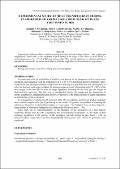Показать сокращенную информацию
Using models of energy consumption from influencing factors to assess the current state and energy efficiency forecasting
| dc.contributor.author | Moroz, D. | |
| dc.contributor.author | Hruntovich, N. | |
| dc.contributor.author | Kapanski, A. | |
| dc.contributor.author | Shenets, Y. | |
| dc.contributor.author | Malashanka, M. | |
| dc.contributor.author | Gracheva, E. | |
| dc.coverage.spatial | France | |
| dc.date.accessioned | 2015-11-26T06:51:46Z | |
| dc.date.available | 2015-11-26T06:51:46Z | |
| dc.date.issued | 2020 | |
| dc.identifier.citation | Using models of energy consumption from influencing factors to assess the current state and energy efficiency forecasting / D. Moroz [et al.] // E3S Web of Conferences, Saint-Petersburg, 29–30 october 2020. – Saint-Petersburg, 2020. – P. 01024. | ru_RU |
| dc.identifier.uri | https://elib.gstu.by/handle/220612/13759 | |
| dc.description.abstract | A complex of tasks that can be solved using mathematical models of the dependence of consumed energy resources on influencing factors are considered in the article. The main type of model for industrial consumers with a simple relationship between energy and technology, is the one-factor model “consumed energy resource-volume of output”. For industrial consumers with a complex relationship between energy and technology, the mathematical model of the dependence of energy resources on technology is determined by several factors. Methods for assessing the current state of energy efficiency, as well as predicting it for the future in the context of the introduction of energy saving measures and changes in the production program were proposed. | en |
| dc.language.iso | en | ru_RU |
| dc.publisher | EDP Sciences | ru_RU |
| dc.title | Using models of energy consumption from influencing factors to assess the current state and energy efficiency forecasting | ru_RU |
| dc.type | Article | ru_RU |
| local.identifier.doi | 10.1051/e3sconf/202022001024 |
